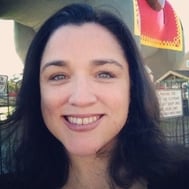I’ve been asked and have discussed the above with others.
My Answer: How could it not?
A diagnosis of any disease or condition is a traumatic event for everyone who loves the person diagnosed. Trauma changes us on cellular level — both mentally and physically.
Diabetes is full of dualities and it’s both my opinion and experience that diabetes provides us with specific checks and balances.
Diabetes makes us more cautious and aware — we have to be, the diabetes what-ifs are always lingering in the background — they have the power to stop us in our tracks.
What if my blood sugar goes low?
What if my blood sugar goes high?
What if I develop complications?
What the hell is going to happen with my insurance this year?
On the flip-side: Diabetes pushes us to go outside our diabetes comfort zones, like embracing new D technologies in order to better manage our diabetes.
Living life with diabetes also lets us prove the doubters wrong.
Don’t think women with diabetes can’t have children? THINK AGAIN.
Don’t believe people with diabetes can play pro sports? WRONG.
Don’t believe people can travel around the globe and on their own because of diabetes?
NOT TRUE. I know so many people with diabetes who have travelled around the globe — it’s impossible to tag them all.
Personally, I’ve travelled to 17 different counties with diabetes as my travel companion — diabetes never stopped me from traveling, sometimes it made traveling more challenging, but it never stopped me from doing it.
COVID-19 is what’s stopping me from traveling and halting new stamps in my passport, not diabetes.
Diabetes necessitates that we adhere to certain daily musts (insulin therapy, oral medications, monitoring our glucose levels, etc.), in order to stay alive, while simultaneously compelling us to embrace flexibility — because diabetes isn’t one size fits all and doesn’t always play by the rules.
Diabetes is a different beast daily.
Diabetes makes us acutely aware of our body’s idiosyncrasies when it comes to our health — diabetes and otherwise. And that’s a gift that keeps on giving.
Years ago and for the first time in decades, I developed a new low symptom — but the first time it happened I had no idea what the hell was going on.
I was working at my computer and all of a sudden my entire mouth started to go numb.
I had no idea what was happening and I wasn’t experiencing any of my normal low blood sugar symptoms. No shakes, no sweats, no delayed cadence in my speech.
It was weird. I was concerned. Because I live with diabetes, I grabbed my meter and checked my blood sugar. It was 59.
I did a second blood sugar check. It was 58.
That was the day I discovered I’d developed a brand new low blood sugar symptom in my 30s.
Diabetes was the cause of the unknown new symptom, living with diabetes made me acutely aware that something was off and that I needed to explore further.
Sometimes diabetes causes us to turn inward — like when dealing with a low blood sugar in public - Our brains tell us to treat the low, ASAP, whereas our pride is not always wanting to draw attention when we feel our most vulnerable.
Diabetes forces us to develop our diabetes voices and be heard — to speak up and speak out - diabetes requires us to advocate for ourselves and others.
Diabetes and diabetes burnout can cause us to feel isolated; alone, depressed, broken and unsure of ourselves.
The DOC reminds us that we are not alone — that we are more than the sum of our faulty parts.
Diabetes turns us into both gladiators and peace makers.
Gladiators because every day we battle with our diabetes to take the lead, fighting our health insurance companies for tools to enable better diabetes management, demanding healthcare professionals to hear what we have to say, while continually busting diabetes myths at every turn.
Peacemakers because diabetes is part of who we are, and has become part of our personal narrative — finding a way to live well with our diabetes is paramount.
PWDs know what it’s like to struggle and feel alone, scared, incredibly ticked off and frustrated with our health and our healthcare system. And because we live with all of the above, the majority of us are more compassionate and empathetic to others - we understand first-hand what it’s like to struggle.
Being diagnosed with diabetes changes who we are, changes our lives and the lives of the people who love us.
I never wonder who I’d be if diabetes hadn’t entered my world — that’s a waste of time and energy and there’s no going back. Instead, I focus on who I am; the lessons I’ve learned and continue to learn, how far I’ve come in my life… and my life with diabetes.



